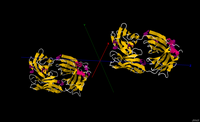
Photo from wikipedia
Cabozantinib is an oral tyrosine kinase inhibitor (TKI) approved for the treatment of patients with advanced renal cell carcinoma (RCC) at a dose of 60 mg/day. As with other TKIs, cabozantinib… Click to show full abstract
Cabozantinib is an oral tyrosine kinase inhibitor (TKI) approved for the treatment of patients with advanced renal cell carcinoma (RCC) at a dose of 60 mg/day. As with other TKIs, cabozantinib is associated with high interpatient variability in drug clearance and exposure that can significantly impact safety and tolerability across a patient population. To optimize cabozantinib exposure (maintaining efficacy and tolerability) for the individual, patients may require treatment interruption with dose reduction (40 mg/day and then 20 mg/day). In the pivotal Phase 3 METEOR trial, cabozantinib significantly improved overall survival, progression-free survival and the objective response rate compared with everolimus in patients with advanced RCC who had received previous treatment with a VEGFR TKI. Dose reductions were common for patients receiving cabozantinib (60%) but effective as only 9% discontinued treatment due to adverse events (AEs). In this review, we discuss pharmacometric analyses that evaluated the impact of cabozantinib dose on efficacy and safety outcomes during the METEOR study. Exposure-response models demonstrate that the risk of experiencing adverse events and dose reduction is increased in patients with low cabozantinib clearance versus typical clearance and decreased in patients with high clearance. Dose reduction of cabozantinib to manage AEs is predicted to have minimal impact on efficacy as AEs are more likely to occur in patients with low clearance and higher exposure to cabozantinib. These analyses further support a dose modification strategy to optimize cabozantinib exposure for individual patients.
Journal Title: Cancer treatment reviews
Year Published: 2020
Link to full text (if available)
Share on Social Media: Sign Up to like & get
recommendations!